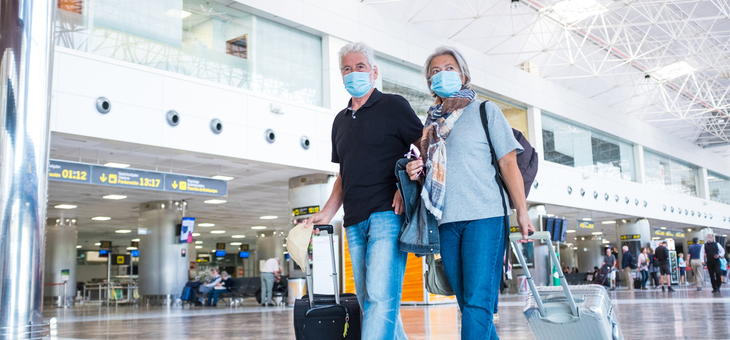We’re all quite familiar with the benefits of wearing face masks during the pandemic.
And while acceptance of wearing them for the foreseeable future may not quite have set in yet, scientists may have found a reason to make the process more appealing.
They say that if at least 70 per cent of the public wore face masks consistently, the pandemic could be stopped.
Studies exploring the physics of face mask use and disease transmission, as well as investigations into materials, design and other issues affecting the way face masks work, have reinforced the efficacy of masks in filtering or blocking the virus.
In the journal Physics of Fluids, investigators have collated and analysed all they know about masks, including how they should be worn and the most effective materials.
They found that wearing the right masks, the right way, could effectively eradicate the virus without the need for a vaccine.
When studying the size of fluid droplets expelled from the nose and mouth when a person talks, sings, sneezes, coughs or even simply breathes, scientists were able to identify the best masks to wear.
“Larger droplets, with sizes around 5–10 microns, are the most common,” say journal authors Sanjay Kumar and Heow Pueh Lee.
“These droplets are still quite small, however. To compare, a human hair is about 70 microns in diameter.
“Even smaller droplets, those below five microns, are possibly more dangerous. These can become aerosolised and remain suspended in air for long periods.
“Among the many types of masks in use (cloth masks, surgical masks and N95 masks), only N95s can filter out aerosol-sized droplets.”
However, the authors acknowledge that wearing a mask for many hours on end can be uncomfortable, especially in hot and humid conditions.
This, they say, may lead to ‘short cuts’ in how masks are worn, making them less effective.
The investigators said masks made of hybrid polymer materials could effectively filter infected particles and still keep the face cool.
“There could be some relation between breathing resistance and the flow resistance of the face mask, which will need to be studied for a face mask-wearing interval,” said Heow Pueh Lee.
“Also, the environmental condition in the compartmental space within the face mask will need to be more accurately quantified using miniaturised sensors and the development of human replicas for such studies.”
The investigators studied whether face masks reduce the effective reproduction number, as when the reproduction number drops below one, the epidemic stops spreading.
They used a New York State study as an example and the results were promising.
“The results suggest that the consistent use of efficient face masks, such as surgical masks, could lead to the eradication of the pandemic if at least 70 per cent of the residents use such masks in public consistently,” said Sanjay Kumar.
“Even less efficient cloth masks could also slow the spread if worn consistently.”
The wearing of face masks in public coupled with lockdowns has enabled Victoria to go from a disastrous case rate to 30 days without a single infection.
This performance has captured the world’s attention.
The director of the United States National Institute of Allergy and Infectious Diseases, Dr Anthony Fauci, now hails Australia as the model nation for combatting COVID-19.
“What Australia has done is the proof of the pudding,” said Dr Fauci.
“When you uniformly implement public health measures, be that full lockdown or partial lockdown, you can turn off the surges. That worked.
“It’s clear that countries and states that do not embrace restrictions do not blunt the curve as well as those that do. The epitome of that has been the success of Australia.
“I know that Victoria is down to almost no cases or even zero cases. In the US, we are in a difficult situation because of the reluctance of substantial proportions of the population not to fully implement the mitigation methods.
“There is an extraordinary divisiveness in our country. When that spills over into the implementation of public health measures – where things like wearing a mask become almost a political statement – it really complicates the issue.”
Do you take issue with wearing a face mask? Would you accept wearing a mask for the foreseeable future if it meant eradicating the virus, or would you prefer to wait for a possible vaccine?
If you enjoy our content, don’t keep it to yourself. Share our free eNews with your friends and encourage them to sign up.
Related articles:
https://www.yourlifechoices.com.au/health/covid19/why-your-face-mask-is-your-best-friend
https://www.yourlifechoices.com.au/health/covid19/how-to-tell-an-antimasker-to-mask-up
https://www.yourlifechoices.com.au/health/covid19/how-to-wear-a-face-mask

